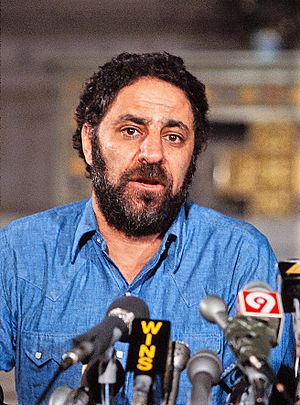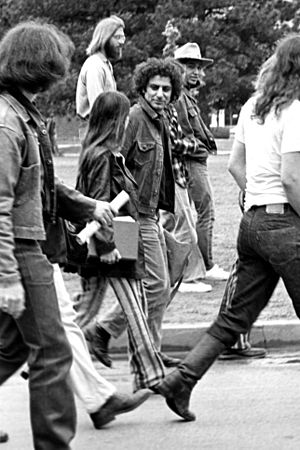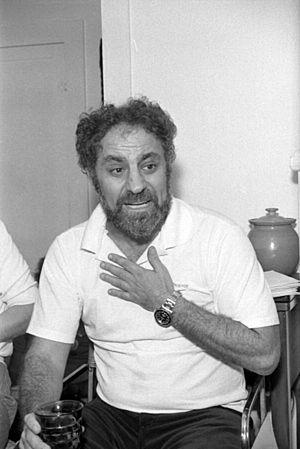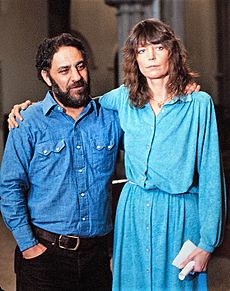Abbie Hoffman facts for kids
Quick facts for kids
Abbie Hoffman
|
|
|---|---|

Hoffman at a press conference in 1981
|
|
| Born |
Abbot Howard Hoffman
November 30, 1936 Worcester, Massachusetts, U.S.
|
| Died | April 12, 1989 (aged 52) Solebury Township, Pennsylvania, U.S.
|
| Other names |
|
| Education | Worcester Academy Brandeis University (BA) University of California, Berkeley (MA) |
| Occupation |
|
| Years active | 1967–1989 |
| Known for | Political philosophy, social revolution, guerrilla theater, Civil Rights Movement, gift economics |
|
Notable work
|
|
| Movement | Yippie, 1960s counterculture |
| Spouse(s) |
|
| Children | 3 |
Abbot Howard "Abbie" Hoffman (November 30, 1936 – April 12, 1989) was an American activist. He was known for his role in the 1960s counterculture and his protests against the Vietnam War. Hoffman helped start the Youth International Party (also known as the "Yippies"). He was also a famous member of the Chicago Seven group.
Abbie Hoffman was a strong supporter of the Flower Power movement. This movement used peaceful protest and symbols like flowers to promote love and peace. He continued his activism into the 1970s. Hoffman is still seen as an important figure in the anti-Vietnam War movement. He passed away in 1989 when he was 52 years old.
Who Was Abbie Hoffman?
Abbie Hoffman was a well-known American activist. He used creative and sometimes funny ways to protest. He wanted to bring attention to social and political issues. His actions often made headlines. He became a symbol of the 1960s youth movement.
Early Life and School
Abbot Howard Hoffman was born on November 30, 1936. His family lived in Worcester, Massachusetts. He grew up in a middle-class Jewish family. He had two younger brothers and sisters. As a child, he was known for being a bit of a troublemaker. He liked to play pranks and challenge rules.
Hoffman was expelled from his high school. This happened after an argument with a teacher. He then went to Worcester Academy and finished in 1955. In his teenage years, he enjoyed things like riding motorcycles. He also wore leather jackets, which was a rebellious style at the time.
After high school, he went to Brandeis University. There, he studied psychology. He learned from famous professors like Abraham Maslow. He also studied with Marxist thinker Herbert Marcuse. Marcuse's ideas greatly influenced Hoffman's political views. Hoffman graduated with a degree in psychology in 1959. He then went to the University of California, Berkeley for more studies.
Countercultural Activism
Before becoming famous with the Yippies, Hoffman was active in other groups. He worked with the Student Nonviolent Coordinating Committee (SNCC). He also helped "Liberty House," which supported the civil rights movement. During the Vietnam War, he became a strong anti-war activist. He often used humor and theater in his protests.
One of Hoffman's most famous stunts happened in 1967. He went to the New York Stock Exchange (NYSE) with other activists. They threw dollar bills down onto the trading floor. Traders below scrambled to pick up the money. Hoffman said this showed what traders were already doing. After this event, the stock exchange put up bulletproof glass.
In October 1967, Hoffman joined a protest at the Pentagon. He famously claimed he would use "psychic energy" to make the Pentagon levitate. He said it would turn orange and vibrate. He believed this would end the Vietnam War. Poet Allen Ginsberg led chants to help him.
Chicago Seven Trial
Hoffman was part of a group called the Chicago Seven. This group included other activists like Jerry Rubin. They were charged by the government. The charges were related to anti-Vietnam War protests. These protests happened in Chicago during the 1968 Democratic National Convention.
The trial was led by Judge Julius Hoffman. Abbie Hoffman often caused a stir in the courtroom. He and Rubin once wore judge's robes to court. Another time, Abbie Hoffman gave a rude hand gesture while being sworn in. He often made jokes and insulted the judge. He even told the judge he was a "disgrace."
Many famous people were called to speak at the trial. These included Allen Ginsberg and Norman Mailer. Abbie Hoffman ended the trial with a speech. He quoted Abraham Lincoln. He said Lincoln would have been arrested too if he were alive.
In February 1970, Hoffman and four others were found guilty. They were accused of trying to cause a riot. However, all these convictions were later overturned. This means they were canceled after an appeal.
Continuing Protests
At the Woodstock Festival in 1969, Hoffman tried to speak on stage. He interrupted The Who's performance. He wanted to protest the jailing of John Sinclair. Pete Townshend of The Who pushed him off the stage. Townshend later said he agreed with Hoffman's message. But he felt Hoffman had disrespected the stage.
In 1971, Hoffman published a book called Steal This Book. It gave advice on how to live without spending money. Many people took the title seriously and stole the book. This made some bookstores refuse to sell it. He also wrote other books, like Vote!.
Later Activism
In the 1980s, Hoffman continued his activism. In 1986, he was arrested at the University of Massachusetts Amherst. He was protesting the Central Intelligence Agency (CIA) recruiting on campus. He argued that the CIA was involved in illegal activities.
Hoffman acted as his own lawyer in court. He quoted Thomas Paine, a leader of the American Revolution. He said that people should correct wrongs when their country is wrong. In April 1987, the jury found Hoffman and the others not guilty.
After this, Hoffman appeared in a movie. He had a small role in Oliver Stone's film Born on the Fourth of July. He played himself, waving a flag during a campus protest. The movie was released after his death.
Personal Life
Abbie Hoffman married Sheila Karklin in 1960. They had two children, Andrew and Amy. They divorced in 1966. In 1967, he married Anita Kushner. They had one son, whom they named America. Hoffman and Kushner later divorced in 1980.
His life was closely watched by the Federal Bureau of Investigation (FBI). They had a very large file on him.
Death
Abbie Hoffman was found dead in his apartment on April 12, 1989. He was 52 years old. He had been feeling sad. He had recently changed his treatment for a health condition. His mother had also been diagnosed with cancer. Some friends believed he was also unhappy about getting older. He was also disappointed that young people in the 1980s were not as interested in protesting as those in the 1960s.
His memorial service was held a week later. It took place in Worcester, Massachusetts. About 1,000 friends and family attended the service.
Works
Books
- Revolution For the Hell of It (1968)
- Woodstock Nation: A Talk-Rock Album (1969)
- Steal This Book (1971)
- Vote! A Record, A Dialogue, A Manifesto – Miami Beach, 1972 And Beyond (1972) by Hoffman, Jerry Rubin, and Ed Sanders
- To America With Love: Letters From the Underground (1976) by Hoffman and Anita Hoffman
- Soon to Be a Major Motion Picture (1980)
- Square Dancing in the Ice Age: Underground Writings (1982)
- The Best of Abbie Hoffman (1990)
- Preserving Disorder: The Faking of the President 1988 (1999) by Hoffman and Jonathan Silvers
Record
- Abbie Hoffman and The Joint Chiefs of Staff. Wake Up, America! Big Toe Records (1971)
Media
Appearances in documentary films
Hoffman is featured in interviews and old news footage in these documentaries:
- Last Summer Won't Happen (1968)
- Prologue (1970)
- Breathing Together: Revolution of the Electric Family (1971)
- Lord of the Universe (1974)
- It Was 20 Years Ago Today (1987)
- Growing Up in America (1988)
- My Dinner with Abbie (1990)
- My Name Is Abbie (1998)
- Phil Ochs: There but for Fortune (2010)
Appearances in feature films
- Born on the Fourth of July (1989); Hoffman appears as a protest organizer.
Appearances on television
- Vanguard Press's 10th Anniversary Media Bash, February 17, 1988. With Abbie Hoffman, Dave Dellinger, and Bernie Sanders.
- The Coca Crystal Show: If I Can't Dance, You Can Keep Your Revolution, MANHATTAN CABLE TELEVISION.
Appearances on radio
- Abbie Hoffman on WMCA radio, 1971
- Abbie Hoffman on WBAI radio
- Abbie Hoffman – 1988 – Howard Stern Show
Images for kids
See Also
 In Spanish: Abbie Hoffman para niños
In Spanish: Abbie Hoffman para niños
- List of peace activists
- October Surprise conspiracy theory








